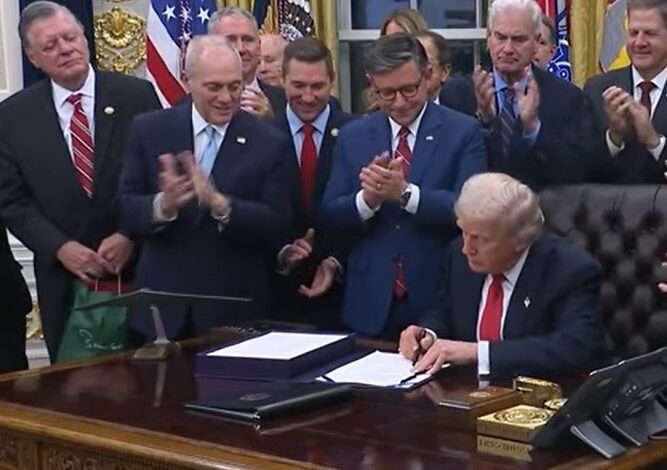
Longest U.S. government shutdown ends as Trump signs funding bill
The longest government shutdown in U.S. history officially ended on Wednesday after President Donald Trump signed legislation passed by Congress to temporarily fund federal operations and bring an end to the 42-day standoff between Republicans and Democrats.
The House of Representatives approved the funding bill earlier in the day, following its passage in the Senate, breaking weeks of political gridlock that had paralyzed key government services.
“It’s a great day,” President Trump declared after signing the measure, which Republicans hailed as a political victory since it passed without accepting Democratic demands to extend subsidies for the Affordable Care Act (Obamacare).
The impasse was broken when eight Democrats in the Senate joined Republicans to advance the bill for a final vote. The legislation provides temporary funding for most federal operations through the end of the year, with certain programs — including military pensions and food assistance for roughly 42 million Americans — funded through September.
Essential services, such as air travel safety, food aid, and public health programs, are now expected to resume operations, though officials warned it may take time to fully restore normalcy. All affected federal employees will receive back pay, including those who worked without pay during the shutdown, such as air traffic controllers and airport security personnel.
Reflecting on the shutdown’s political fallout, Trump told reporters, “The American people should not forget this when we come up to the midterms.”
House Democratic Leader Hakeem Jeffries countered, saying, “Either Republicans decide to extend the Affordable Care Act tax credits this year, or the American people will throw Republicans out of their jobs next year.”
Despite the shutdown’s end, the political rift remains. Democrats have expressed frustration over internal divisions after several members voted with Republicans, while others blamed Senate Majority Leader Chuck Schumer for failing to prevent defections.
A small but controversial clause within the bill also prohibits federal prosecutors from searching senators’ phone records without prior notice and allows compensation of up to $500,000 for violations — a provision retroactive to 2022, following investigations into the January 6 Capitol breach.
Although the shutdown likely hurt Republicans in recent elections, it also pressured federal employees and low-income Americans reliant on government assistance, prompting some Democrats to concede and push for compromise.